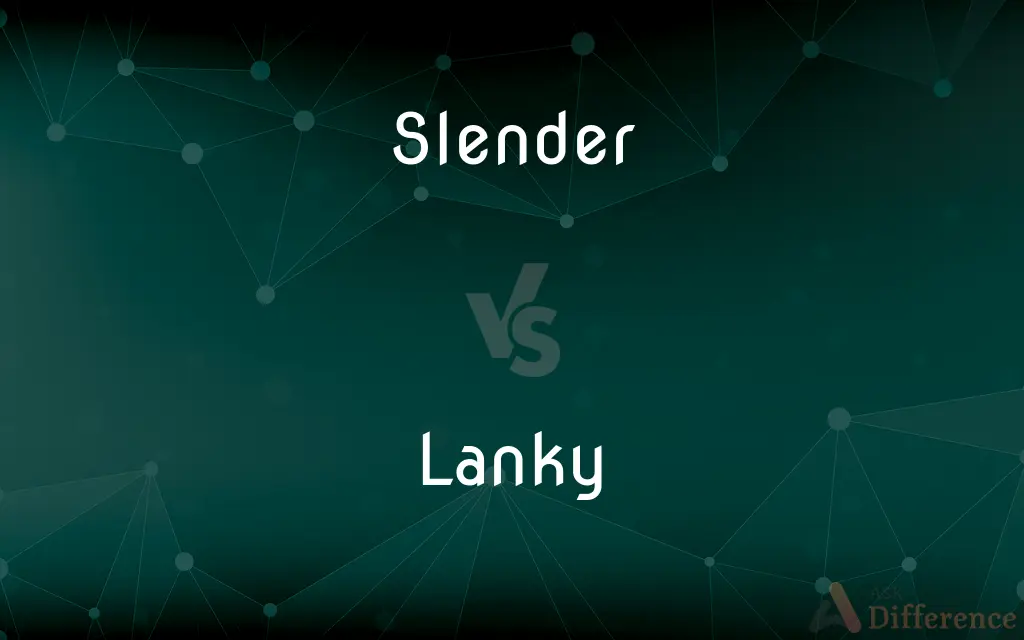Slender vs. Lanky — What's the Difference?
Edited by Tayyaba Rehman — By Fiza Rafique — Updated on April 6, 2024
Slender describes a gracefully thin figure, often implying attractiveness and proportion, whereas lanky refers to awkwardly tall and thin, emphasizing disproportion or lack of grace.

Difference Between Slender and Lanky
Table of Contents
ADVERTISEMENT
Key Differences
Slender is a term that conveys a sense of elegance and proportionality, often used to describe a figure that is appealingly thin without being overly so. It suggests a balanced, aesthetically pleasing form. On the other hand, lanky implies a more awkward or ungainly thinness, often associated with excessive height and a lack of grace or coordination. It can suggest disproportion rather than an ideal balance.
The term slender often carries positive connotations, implying not just thinness but a kind of gracefulness or delicacy in form. It's frequently used in contexts where physical attractiveness and proportion are emphasized, such as in fashion or personal descriptions. Lanky, however, often has neutral or slightly negative connotations, emphasizing a gangliness or awkwardness in appearance, especially due to tall stature.
Slender figures are typically described in a way that highlights an attractive or desirable form, suggesting a body type that many might aspire to or admire. This term is versatile, applicable to various contexts without implying awkwardness. Lanky, by contrast, focuses on an unusual or exaggerated length, especially of the limbs, which might not be universally perceived as desirable. It often highlights an absence of muscularity or bulk, sometimes implying a certain clumsiness.
In literature and media, characters described as slender are often portrayed with an air of elegance or refinement, their physique contributing to their overall characterization in a positive light. Lanky characters, however, are sometimes depicted with a focus on their awkward height and thinness, which can be used to emphasize youthfulness, inexperience, or a comedic element.
Despite these differences, both terms share a focus on thinness, albeit with varied implications regarding elegance, proportion, and attractiveness. The key distinction lies in the connotations each term carries and the specific physical attributes they highlight. While slender is more universally flattering, lanky brings attention to height and thinness in a way that is not necessarily aligned with conventional standards of attractiveness.
ADVERTISEMENT
Comparison Chart
Connotation
Positive, implying grace and proportion.
Neutral or negative, implying awkwardness.
Focus
Thinness with an implication of attractiveness and balance.
Height and thinness, often with a focus on disproportion.
Typical Context
Fashion, beauty, personal descriptions.
Descriptions of awkward or youthful individuals.
Physical Implication
Elegance and delicacy.
Gangliness, often with elongated limbs.
Perceived Attractiveness
High, associated with desirability.
Variable, often less conventionally attractive.
Compare with Definitions
Slender
Gracefully thin.
The dancer's slender form moved elegantly across the stage.
Lanky
Ungracefully thin and tall.
The lanky teenager towered over his peers.
Slender
Slim and attractive.
The portrait captured her slender figure beautifully.
Lanky
Having long limbs.
His lanky arms were an advantage in basketball.
Slender
Slight in form or construction.
The slender volume of poetry was cherished by many.
Lanky
Awkwardly tall.
His lanky stature made finding clothes a challenge.
Slender
Finely drawn or constructed.
The bridge’s slender arches were an engineering marvel.
Lanky
Tall and thin, often implying gangliness.
The lanky pup grew into its paws eventually.
Slender
Delicately built.
The slender branches swayed gently in the breeze.
Lanky
Thin and uncoordinated.
The lanky foal stumbled as it walked.
Slender
(of a person or part of the body) gracefully thin
Her slender neck
Lanky
Tall, thin, and often ungainly.
Slender
(of something abstract) barely sufficient in amount or basis
People of slender means
A slender majority of four
Lanky
(informal) Tall, slim, and rather ungraceful or awkward.
Slender
Having little width in proportion to height or length; long and thin
A slender rod.
Lanky
Somewhat lank; tall, thin, bony and ungraceful.
The lanky Dinka, nearly seven feet in height.
Slender
Thin and delicate in build; gracefully slim
"She was slender as a willow shoot is slender—and equally graceful, equally erect" (Frank Norris).
Lanky
Tall and thin and having long slender limbs;
A gangling teenager
A lanky kid transformed almost overnight into a handsome young man
Slender
Small in amount or extent; meager
Slender wages.
A slender chance of survival.
Lanky
Ungracefully tall and thin
Slender
Thin; slim.
A rod is a long slender pole used for angling.
Slender
(figurative) meagre; deficient
Being a person of slender means, he was unable to afford any luxuries.
Slender
(Gaelic languages) Palatalized.
Slender
Small or narrow in proportion to the length or the height; not thick; slim; as, a slender stem or stalk of a plant.
She, as a veil down to the slender waist,Her unadorned golden tresses wore.
Slender
Weak; feeble; not strong; slight; as, slender hope; a slender constitution.
Mighty hearts are held in slender chains.
They have inferred much from slender premises.
The slender utterance of the consonants.
Slender
Moderate; trivial; inconsiderable; slight; as, a man of slender intelligence.
A slender degree of patience will enable him to enjoy both the humor and the pathos.
Slender
Small; inadequate; meager; pitiful; as, slender means of support; a slender pittance.
Frequent begging makes slender alms.
Slender
Spare; abstemious; frugal; as, a slender diet.
The good Ostorius often deignedTo grace my slender table with his presence.
Slender
Uttered with a thin tone; - the opposite of broad; as, the slender vowels long e and i.
Slender
Being of delicate or slender build;
She was slender as a willow shoot is slender
A slim girl with straight blonde hair
Watched her slight figure cross the street
Slender
Very narrow;
A thin line across the page
Slender
Having little width in proportion to the length or height;
A slender pole
Slender
Small in quantity;
Slender wages
A slim chance of winning
A small surplus
Slender
Gracefully slender; moving and bending with ease
Common Curiosities
What does lanky imply about a person's appearance?
Lanky implies that a person is awkwardly tall and thin, often with an emphasis on disproportion or lack of grace.
How do cultural perceptions affect the interpretation of slender and lanky?
Cultural standards of beauty and attractiveness greatly influence how slender and lanky are perceived, with slender generally being more universally admired.
Are slender people always tall?
No, slender focuses more on thinness and proportion rather than height, making it applicable to individuals of various statures.
What does slender mean?
Slender refers to someone who is gracefully thin, often in an attractive or elegant manner.
Can slender be used to describe objects other than people?
Yes, slender can describe anything characterized by thinness and grace, such as objects or natural features.
Can someone be both slender and lanky?
While both terms denote thinness, their connotations differ significantly; it’s less common to use them interchangeably due to the elegance implied by slender and the awkwardness implied by lanky.
Can the term slender have negative connotations?
While generally positive, slender could be perceived negatively if associated with fragility or weakness, depending on context.
How do fashion and media influence the perceptions of these terms?
Fashion and media often promote slender figures as ideal, influencing societal standards and perceptions of beauty, which can affect how both terms are viewed.
Is being lanky considered attractive?
Perceptions of attractiveness vary; lanky can be seen as less conventionally attractive due to its association with awkwardness, though this depends on individual and cultural preferences.
How does physical fitness relate to being slender or lanky?
Physical fitness can influence body composition but does not directly correlate with being slender or lanky, which are more about natural body shape and proportions.
Do lanky individuals always have difficulty with coordination?
Not necessarily; while lanky can imply awkwardness, individuals described this way can be quite athletic or coordinated, especially as they grow accustomed to their stature.
What role does body language play in the perception of someone as lanky?
Body language can accentuate the perception of awkwardness or grace, influencing whether someone is viewed as lanky or slender.
Can animals be described as lanky?
Yes, animals, especially young ones that have not grown into their proportions, can be described as lanky.
Is slender always a compliment?
Generally, yes, but context and tone can influence whether it's perceived as a compliment.
Can the perception of slender and lanky change over time?
Yes, perceptions can evolve with changing beauty standards, personal growth, and increased confidence, affecting how individuals are seen or see themselves.
Share Your Discovery

Previous Comparison
Locksmith vs. Blacksmith
Next Comparison
Super vs. UltraAuthor Spotlight
Written by
Fiza RafiqueFiza Rafique is a skilled content writer at AskDifference.com, where she meticulously refines and enhances written pieces. Drawing from her vast editorial expertise, Fiza ensures clarity, accuracy, and precision in every article. Passionate about language, she continually seeks to elevate the quality of content for readers worldwide.
Edited by
Tayyaba RehmanTayyaba Rehman is a distinguished writer, currently serving as a primary contributor to askdifference.com. As a researcher in semantics and etymology, Tayyaba's passion for the complexity of languages and their distinctions has found a perfect home on the platform. Tayyaba delves into the intricacies of language, distinguishing between commonly confused words and phrases, thereby providing clarity for readers worldwide.















































